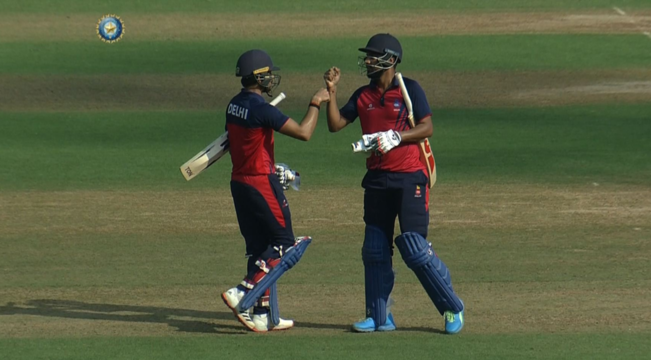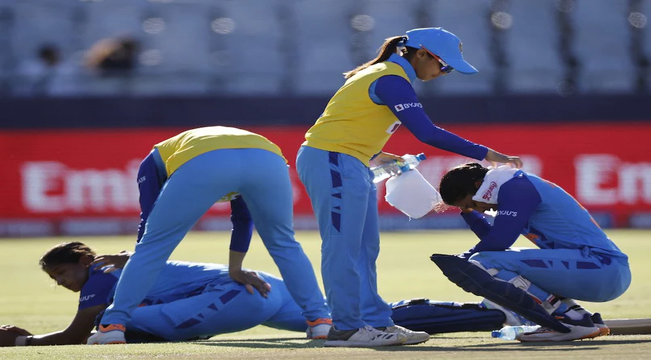
New Delhi, November 06, 2020: Mumbai Indians had been a cut above the rest in making their way to the top of the standings in the league stage of IPL 2020. On first viewing, only two points separated them and second-placed Delhi Capitals – but if you’d followed the season even somewhat closely, you know there was a gulf between the defending champions and their challengers in the UAE.
That gulf was amply clear on Thursday, as Mumbai put themselves one win away from a record-extending fifth IPL crown with a crushing 57-run win over Delhi to kickstart the IPL 2020 Playoffs.
It was MI’s third win over the Capitals in this edition – also the biggest victory margin in any of the 10 Qualifier 1 games seen in the IPL so far – and allows the holders a four-day break before they return to the Dubai International Cricket Stadium for the summit clash on Tuesday, 10 November.
A look at the talking points from Qualifier 1 of IPL 2020.
If A doesn’t get you, B will; if B doesn’t, C will…
There are well-rounded batting lineups. There are dangerous batting lineups. And then, there’s this intimidating assembly of the Mumbai Indians.
On a day when both Rohit Sharma and Kieron Pollard – more T20 runs between them than rest of the XI put together – fell without scoring, MI posted 200 on the board. The 200-run mark, for context, had only been touched once in the last 34 games this tournament.
Even before Rohit fell for a first-ball duck, his side had already seized early initiative with Quinton de Kock stroking 15 runs off the first over. The skipper’s ouster did little to stem the flow of runs, with de Kock and Suryakumar Yadav adding 62 runs in the next 6.1 overs.
But after making 71/1 in the first seven overs, MI crawled to 37/3 in the next seven and it appeared as though DC had triggered a rare collapse – only for the last six overs to be dispatched for 92, thanks to the muscle of Hardik Pandya and the dexterity of Ishan Kishan.
MI had finished the league campaign miles ahead of anyone else in terms of runs at the death (12.41 per over); that figure now stands at 12.67 – the best death overs return for any team in IPL history.
De Kock, Yadav and Kishan have all crossed 450 runs, with the lowest strike rate among the three reading 139.59. Pollard and Pandya are the only batsmen with strike rates above 180 this season, and both of them have 250+ runs too. Kishan sits on top of the six-hitting charts, with four MI batsmen in the top-10.
For the fourth straight year, Rohit hasn’t fired in the IPL. For the second straight year, it doesn’t look like it’s going to hurt Mumbai Indians.
Delhi dented by troubles of pace trio
Ravichandran Ashwin bowled four overs for 29 runs, taking the wickets of Rohit, de Kock and Pollard. If this was the first half of the season, you’d imagine Delhi would have been looking at a sub-150 target. Except it wasn’t – and the fortunes of their fast men continued to be in freefall after a brief pause in the final league outing against Royal Challengers Bangalore.
At the nine-game mark of the season, when Kagiso Rabada and Anrinch Nortje had combined returns of 31 wickets at 7.72 runs per over, not many would have guessed that the South African duo would cost the Capitals an all-important game. Mumbai took 92 runs from their eight overs, losing just one wicket.
Add Daniel Sams to the mix, and Delhi’s frontline pacers leaked 1/136 in 12 overs.
Meanwhile, Marcus Stoinis, tasked with bowling the 17th over of the innings, gave away five runs and dismissed Krunal Pandya. And Shreyas Iyer didn’t bowl him again, opting instead to go with one over each of his frontline picks. The result? 55/0 in the last three overs.
Sams and Nortje might still cite their relative inexperience in their defense, but Delhi will dearly pray for the Rabada of the first month of IPL 2020 to return come Qualifier 2. After picking up 23 wickets at 7.63 runs per over in the first 11 matches, Rabada has returned only two wickets in the last four outings – while conceding 10.25 per over.
Capitals’ crumbling batsmen sink further still
If the bowling is in freefall, the DC batting is turning invisible.
In seven of their last nine games, Delhi’s opening stand hasn’t survived the first over.
Prithvi Shaw has 30 runs from his last seven innings. Rishabh Pant has a strike rate of 85 since returning from injury. Iyer himself has been dawdling along at a run-a-ball.
The Capitals’ SIP (Shaw-Iyer-Pant) is offering no returns. Between them, in the last six matches, the vaunted trio has 247 runs from 266 balls – 5.57 runs per over, 13.72 runs per innings.
All said, since the end of their ninth game, Delhi have been scoring at barely seven runs per over and averaged just over 18 runs per wicket.
They are the only ‘original’ franchise to have never reached an IPL final. If that trend is to be arrested this time, DC’s batsmen need to rise from their slumber.
Boom-Boult-BANG! A thunderous twosome
They’ve been, far and beyond, the best partnership of this IPL. Coming into the playoffs, MI were the only team to have two bowlers on 20 or more wickets – and even if the Capitals harboured any hopes of chasing down their 201-run target, they were laid to rest even before the second over ended.
A double-wicket maiden from Trent Boult. The ball of the tournament from Jasprit Bumrah. For the first time in the history of the IPL, a team found itself three-down with no runs on the board.
And this team, in particular, will be sick of the sight of this pairing: in the last two games between MI and DC, less than a week apart, Boult and Bumrah have combined figures of 12/61 from 14 overs – economy 4.36, average 5.08, strike rate 7.
The regularity of Boult’s early inroads has been astonishing. Over the first 57 matches, 23 wickets have fallen in the first over of an innings; the Kiwi quick – ironically traded to Mumbai from Delhi last year – has been responsible for seven of those first-over strikes according to the reports published in firstpost.com.
14 of Boult’s 22 wickets this season have come in the Powerplay, at frugal returns of 6.61 per over. Bumrah’s Powerplay impact, too, has shot up in the presence of his new partner: seven Powerplay wickets from just 16 overs, at less than a run-a-ball. For wider perspective, Mohammed Shami also took seven Powerplay wickets this season – but in 31 overs.
Add the rest of his carnage, and with 27 wickets, Bumrah now boasts of the biggest haul in any IPL season of 60 or less games; it’s a shame that MI will only play once more, or the all-time mark of 32 (Dwayne Bravo, 2013) would’ve been in serious danger.
Bumrah and Boult’s 49 wickets is more than the returns managed by the entire pace attacks of four of the eight teams in IPL 2020 – this is about as fiery as fast bowling can possibly get in T20s on subcontinental surfaces.




























